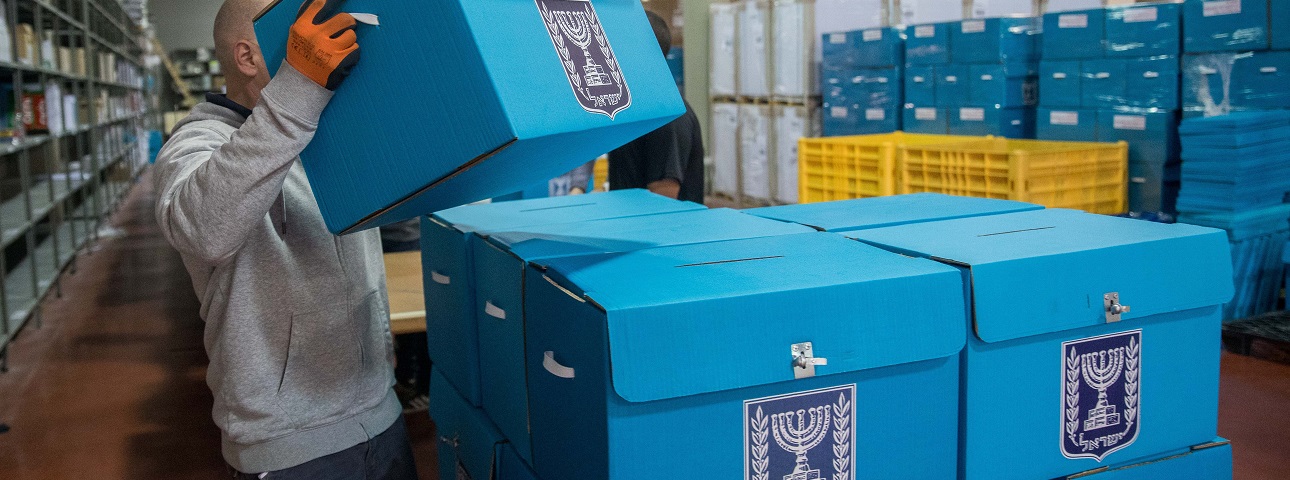Israel Only Parliamentary Democracy With MPs Serving on Central Election Committee
The study, by Dr. Dana Blander, finds that Israel is the only country where sitting members of parliament serve as members of the body that administers and oversees the elections, without any threshold conditions. The members of Knesset and the other members that are party representatives sitting on the Central Election Committee have the authority to make consequential decisions regarding to the election they themselves are usually competing in - including disqualifying lists and the candidates running against them in the election.

Israel’s Central Election Committee currently operates as a two-pronged operation. The professional operation – made up of independent employees – and the political operation consisting of representatives of the factions currently serving in the Knesset.
In an international comparison of 217 countries, it was found that in most (124) appointment to the committee is based on expertise. In fact, appointments to central election committees only based on a partisan affiliation can be found only in Israel, Slovakia and Liechtenstein. In the other countries the committee consists of some members that hold a particular professional expertise, as well as others who represent political parties. (p. 118)
The political makeup of Israel’s election committee raises questions about its ability to operate in an independent manner and with professional integrity. Dr. Blander points out that while the disqualification of candidates by the Central Election Committee can be appealed to the Supreme Court, the combination of political-driven decisions by the Committee and a subsequent judicial review, creates an unhealthy tension, and puts the judiciary at the center of a political process. Since 2003, the majority of the Central Election Committee decisions to either disqualify lists or candidates have been overturned by the Supreme Court.
The disqualification of parties is only one example of the conflict of interests between the functions of the Committee and its composition. All members of the Committee have an incentive to thwart new parties seeking to be elected to the Knesset, creating an inherent inequality between political factions already represented in the Knesset and new parties running for the first time. Another example is the apparently technical role of the committee in confirming the election results, which in the elections for the 23rd Knesset concluded with the Committee refusing to unanimously confirm the results. Although the committee confirmed the elections' results, it was not a unanimous decision, since some party representatives refused to confirm it.
Recommendations:
Based on the study’s findings regarding Israel’s Central Elections Committee’s political bias and its unique makeup compared to other democracies, Dr. Blander recommends reforming the Committee’s workings and its makeup. At the center of her proposed reform’s is the establishment of an independent national election authority. Such a professional body will based its decision-making on expertise, and will manage all aspects of the election process at the national and local level. A public committee of experts with relevant experience should be established to prepare the specifications and mandate of such an authority. (Additional detail, chapter Conclusions, p. 136 and specifically p. 142)
International comparison reveals that an independent model for an autonomous management agency is in use in about 70% of countries. In about 21% of countries, elections are managed by an agency overseen by the executive branch of government(mainly in established democracies with a long-standing tradition of independent public service), and in the rest there is a mixed model in which there are two bodies (one administers the elections and is overseen by the government; and the other is an external body for policy and oversight over the election results). (p. 114)
Committee Composition
Appointment - in most countries the entity that appoints the members of the body that administers the elections is non-partisan, For example, a ceremonial head of state (president, king, governor-general), the court, etc. Israel is unique in that political factions are in charge of appointments.
Size - only in Nigeria, Guinea and Chad is the number of committee members similar to the numbers in Israel (about 30 members), in other countries number is significantly lower.
International Examples
UK - the selection process involves a professional team that examines committee members suitability, and in any case, members of registered parties (and those who have not been a member of parliament for 5 years) cannot be elected to the committee. The administrative staff is also required to wait one year from political activity.
South Africa - the head of the independent electoral commission has the authority to disqualify candidates or lists (due to encouraging violence or hatred, not accepting members on racial grounds, etc.). The members of the committee are chosen by the president from a list of independent experts.
